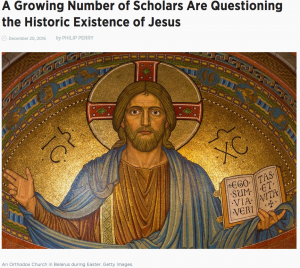What a hoot! Bart Ehrman is listed alongside Richard Carrier as an authority citing reasons to doubt the historical existence of Jesus! (For those not in the know, Ehrman has expressed deep loathing of Carrier and has written a book arguing that anyone who thinks Jesus did not exist is bonkers.)

That’s in the Big Think article by Philip Perry, A Growing Number of Scholars Are Questioning the Historic Existence of Jesus, the same article Breitbart’s Thomas D. Williams views as an attempt by Jesus mythicists to undermine that foundation of Western values, Christmas.
A review of Philip Perry’s articles indicates that he has a gift for framing eye-catching topics. In his article under the heading “growing number of scholars questioning the historic existence of Jesus” he addresses the views of
- Reza Aslan (who argues Jesus was a revolutionary leader; several mainstream biblical scholars have scoffed at Aslan’s work partly on the grounds that it did not consider more recent scholarship on the historical Jesus)
- Richard Carrier
- Bart Ehrman
- Joseph Atwill (who argues the gospel Jesus was a conspiratorial creation of the Roman political and military leaders; Perry adds a video link to Atwill’s views)
And David Fitzgerald even gets a mention with his book, Nailed.
How could Ehrman be listed here under the title indicating he is one of the “mythicists”?
Ehrman focuses on the lack of witnesses. “What sorts of things do pagan authors from the time of Jesus have to say about him? Nothing. As odd as it may seem, there is no mention of Jesus at all by any of his pagan contemporaries. There are no birth records, no trial transcripts, no death certificates; there are no expressions of interest, no heated slanders, no passing references – nothing.”
And some online critics of Ehrman have pointed out that he fails to follow through on the logic of some of his own arguments.
But Perry does have a point when he writes in conclusion:
Most antiquarians believe a real man existed and became mythicized. But the historical record itself is thin.
Exactly. Most critical biblical scholars do not doubt that the Jesus of the gospels, or to be more correct, the Christ of the Gospels, is a mythical figure. Attempts to remove layers of the gospel narratives to locate “the historical Jesus” behind them are fraught with all sorts of methodological problems. See, furthermore, my recent post about one scholar’s explanation about why theologians were so interested in the historical Jesus hidden behind the gospels in the first place: The Relevance of the Historical Jesus for Christian Faith and Theology.
One might well ask why historical Jesus scholars are so heatedly opposed to those who question the existence of Jesus. Don’t both sides agree that the gospel figure is a myth? Is it not therefore more appropriate to ask how the myth arose — whether sourced from a historical figure or other literary/theological ideas?
That post The Relevance of the Historical Jesus for Christian Faith and Theology explains why the origin of the myth is not the dividing question between “historicists” and “mythicists”. The historical Jesus has been of interest to theologians, generally speaking, primarily in order to substantiate, refine and strengthen their faith. (Of course Ehrman is an agnostic but the value of the inclusion of sceptics is also spelled out by Nils Alstrup Dahl (see the post).
We come now full circle back to Breitbart’s “war on Christmas” article by Thomas Williams. After citing a few theologians who (surprise surprise) claim Jesus existed, Williams writes:
In other words, when it comes to history, what you believe depends on what you are willing to believe.
Christians may take some consolation in the fact that more than 2,000 years after his birth, Jesus Christ continues to stir up debate and controversy.
Bart Ehrman would not like the sound of that first sentence. Ehrman declares that it is only “mythicists” who choose to believe “what they are want to believe”. It sounds like Thomas Williams acknowledges that the shoe fits not only the outcast Cinders but her establishment sisters too. I suggest he is right — even though he would not want to admit it.
Who benefits? On the one hand we have people whose faith is bound up on the doctrine that God acted in history, and whose careers are bound up in the study of Jesus, while on the other hand we have, yes, some village atheists who look for any opportunity to knock Christianity, but we also have a few Christians who are also mythicists (e.g. Brodie, Harpur) and atheists for whom the historical existence of Jesus is neither here nor there — it is primarily a matter of intellectual curiosity.
But the last sentence gives the game away even more. Authors like Williams rarely tire of declaring the “power of Jesus” in today’s world. They cannot stop “witnessing” for the gospel and the supposed “power” of Jesus to shake up people even today. Jesus not only lived but he still lives — if “you are willing to believe”.
If you enjoyed this post, please consider donating to Vridar. Thanks!

https://www.youtube.com/watch?v=_LhAt0nWbSw
I can’t think that we have better evidence for Jesus than we have for any of those 10.